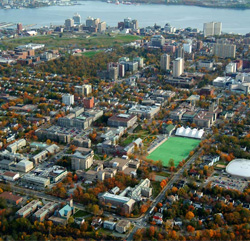Are you a citizen or a subject?
Those are loaded words: âsubject,â in particular, recalls authoritarian monarchs, not what we perceive as âdemocracy.â But Jack Novack, who teaches with Dalâs College of Continuing Education, uses them strategically as part of his quest to get Nova Scotians more involved in local politics.
âSubjects sees themselves as recipients of what government provides for them,â says Mr. Novack. âThey evaluate government on the basis of what they receive either positive or negative. On the other hand, citizens see themselves as being actively engaged in the public debate and in the formulation of public policy.â
The numbers suggest that subjects dominate municipal politics in our province. In the 2008 municipal elections, only 42 per cent of Nova Scotians voted. The result: 75 per cent of incumbent councilors were re-elected, along with 69 per cent of incumbent mayors. As well, 36 per cent of mayors and 23 per cent of councilors assumed office without an election at all.
Thatâs why Mr. Novackâs group, supported by the Province of Nova Scotia and the Union of Nova Scotia Municipalities, is leading a number of projects designed to help Nova Scotians learn how to make a difference in this Octoberâs elections.
âPeople can offer to become a councilor, work on an election campaign, take an active role in promoting an issue that affects them, look into citizen appointments,â he explains. âThere are lots of opportunities, but we have to get away from this notion that politicians, in particular, are these professional individuals who spend their whole careers working towards it.â
One project is a website, , with detailed information both for potential candidates about running a campaign, and voters looking for insight into how to select and support candidates or issues. In addition, his team is kicking off (the first is Friday in Port Hawkesbury) culminating in a âcampaign schoolâ in Truro at the end of June.
âWe try to dispel the attitude that many people have that âI canât do that.â They disqualify themselves, when the reality is that many people could do very, very well in politics. What you need is to truly want to help and work on behalf of your community, and you need time: thatâs the one thing that comes out from everyone Iâve looking at or talked to about this.
âThe hope is to try and get 30, 40, 50 good people out at each of these discussions to learn how to get more involved.â
--
Considering Halifax's elections
There will be ample attention focused on Halifaxâs municipal election this year, especially given the news in February that incumbant major Peter Kelly will not re-offer. We asked Mr. Novack to offer his thoughts on the forthcoming campaign.
 On our municipal culture
On our municipal culture
âThe culture in Halifax not about developing a cohesive vision of what weâre going to be when we âgrow up.â It is more a function of being able to get the best deal you can for the district you represent. As a result, municipal policy becomes the coincidence of district interests.â
On the role of mayor
âWe have whatâs called a âweak mayorâ system. We find the mayor has more symbolic than legal authority, but they have to exercise power informally through persuasion, argument, knowledge. Thatâs a major handicap, in terms of moving forward, especially under this forced marriage called HRM.â
On what a Kelly-less campaign will mean
âI wouldnât be surprised if it opens up the door for some more candidates, both at the district and mayoral level, because they know thereâs a possibility of a new directionâŠthatâs not to say that the council and this mayor ought not to be held accountable, but that has occupied so much media attention that Iâm not sure anything new would come out in a campaign. The public debate should be about a future vision, and the electorate should be able to decide among future visions in a public dialogue. And there are lots of things to talk about.â
On Peter Kellyâs legacy
âI donât think anyone should underestimate the difficult time these municipalities went through to become one after this forced marriageâŠclearly, [Kelly] probably wants a rest and, fairness to the man, he deserves it: heâs put in a lot of hours over a lot of years and sacrificed much, notwithstanding whether you think he was a bad mayor or a good mayor. What he does in the next 5 or 10 years will have an impact on how we see his time as mayor, and it will also depend on the pilipiliÂț»âor lack thereofâof his pilipiliÂț»or.â

